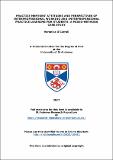Files in this item
Practice mentors' attitudes and perspectives of interprofessional working, and interprofessional practice learning for students : a mixed-methods case study
Item metadata
| dc.contributor.advisor | Campbell, Martin | |
| dc.contributor.author | O'Carroll, Veronica | |
| dc.coverage.spatial | 242 p. | en_US |
| dc.date.accessioned | 2017-03-16T12:47:23Z | |
| dc.date.available | 2017-03-16T12:47:23Z | |
| dc.date.issued | 2017-06-20 | |
| dc.identifier | uk.bl.ethos.707265 | |
| dc.identifier.uri | https://hdl.handle.net/10023/10482 | |
| dc.description.abstract | The demands on health and social care organisations require professions to work more collaboratively. During pre-registration training, health care and social work students learn within practice settings, supported by practice mentors. These settings are rich learning environments to experience interprofessional working (IPW) and for students to learn together through interprofessional practice learning (IPPL). There is, however, evidence that students’ experiences of both are varied or limited. The value placed on IPW, and IPPL, is therefore of interest. This thesis will investigate practice mentors’ attitudes to IPW and IPPL, and explore their perspectives of the enablers and barriers to these occurring in practice settings. A mixed-methods case study approach was used to measure the attitudes of practice mentors from health and social work, and to identify enablers and barriers to IPW, and IPPL for students. Online surveys and semi-structured face to face interviews were carried out with a range of professions within one Scottish health board and associated local authority. Results showed that attitudes to IPW, and IPPL for students were generally positive. Attitudes were not significantly affected by governing body, gender, area of work, years of experience, or prior experience of IPE. IPW was perceived to be enabled by shared processes and policies, IPPL for staff, effective communication, established teams, and shared processes and policies. Proximity to other professions and shared spaces encouraged informal communication and positive interprofessional relationships. Regular structured IPPL opportunities for students were limited. However, where opportunities did occur, this was linked to areas where practice mentors perceived that there was a strong interprofessional team identity. Although attitudes to IPW, and IPPL for students are positive, further work is needed to identify systems for improving IPW, to strengthen professions’ identity as interprofessional teams, and to increase IPPL opportunities for students. | en_US |
| dc.language.iso | en | en_US |
| dc.publisher | University of St Andrews | |
| dc.rights | Attribution-NonCommercial-NoDerivatives 4.0 International | * |
| dc.rights.uri | http://creativecommons.org/licenses/by-nc-nd/4.0/ | * |
| dc.subject | Interprofessional working | en_US |
| dc.subject | Interprofessional practice learning | en_US |
| dc.subject | Case study | en_US |
| dc.subject | Mixed methods | en_US |
| dc.subject | Health and social care | en_US |
| dc.subject.lcc | R737.O3 | |
| dc.subject.lcsh | Interprofessional relations--Scotland--Case studies | en |
| dc.subject.lcsh | Mentoring in medicine--Scotland--Case studies | en |
| dc.subject.lcsh | Mentoring in social service--Scotland--Case studies | en |
| dc.subject.lcsh | Continuum of care--Scotland--Case studies | en |
| dc.subject.lcsh | Mixed methods research | en |
| dc.title | Practice mentors' attitudes and perspectives of interprofessional working, and interprofessional practice learning for students : a mixed-methods case study | en_US |
| dc.type | Thesis | en_US |
| dc.type.qualificationlevel | Doctoral | en_US |
| dc.type.qualificationname | PhD Doctor of Philosophy | en_US |
| dc.publisher.institution | The University of St Andrews | en_US |
The following licence files are associated with this item:
This item appears in the following Collection(s)
Except where otherwise noted within the work, this item's licence for re-use is described as Attribution-NonCommercial-NoDerivatives 4.0 International
Items in the St Andrews Research Repository are protected by copyright, with all rights reserved, unless otherwise indicated.


